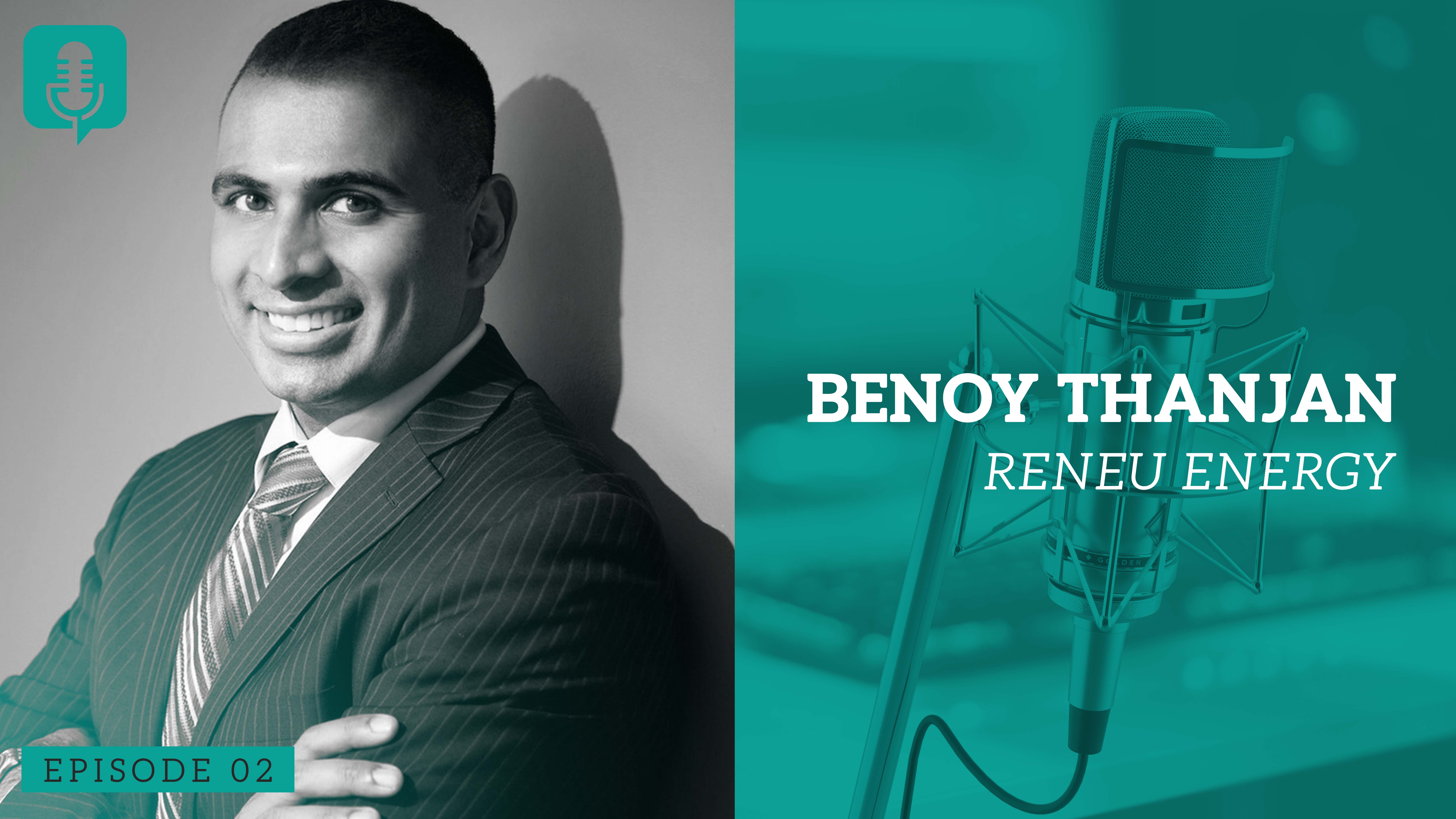In Episode 2 of the Sazmining Podcast, host Will Szamosszegi sits down with Benoy Thanjan, founder and CEO of Reneu Energy. The episode covers a wide range of topics — from the intricacies of financing solar projects to global energy policy, emerging green technologies, and the future of decentralized energy systems.
Benoy’s unique experience across energy finance, solar development, and advisory roles with renewable startups makes him a credible voice on how we can accelerate the clean energy transition. This blog expands on the key themes of their conversation and dives into what it will take to build a scalable and sustainable energy future.
A Journey into Renewable Energy: How Benoy Got Started
Benoy Thanjan didn’t start in clean tech. He began his career in the energy financial advisory division at Deloitte. It was there that he gained exposure to large energy transactions and began to understand the economics behind utilities and power generation. But he quickly realized he wanted to move from the consulting side to the investment side.
This led him to Ridgewood Renewable Power, where he evaluated investments in renewable energy. Even a decade ago, Benoy was confident that solar power would take off — and he wanted to be part of the growth story. He transitioned into a hands-on project finance role at Vanguard Energy Partners and later worked at SolarCity before its acquisition by Tesla. There, he helped manage the trading of solar renewable energy credits (SRECs) in the Northeastern U.S., helping SolarCity scale into new markets.
In 2012, Benoy founded Reneu Energy. Initially a consulting firm focused on SREC management and solar finance, it has since grown into a full-fledged developer and advisor to commercial and utility-scale solar projects.
Reneu Energy’s Expanding Role in the Industry
Reneu Energy now operates across several stages of the solar value chain. It began as a niche consultancy helping clients manage environmental commodities and find investors for their solar assets. Over time, the company expanded to include development of its own projects, which include commercial, industrial, and utility-scale solar arrays.
Today, Reneu Energy helps clients navigate complex markets like New York and New Jersey, where policy structures and financial mechanisms like community solar credits and SREC programs vary dramatically. The company is also collaborating with a European solar firm to develop 150–250 MW of community solar capacity across New York State.
What makes Reneu unique is its ability to operate on multiple fronts — project development, SREC monetization, capital sourcing, and technical advisory. This integrated approach provides its clients with a more complete path from project ideation to completion.
Understanding Solar Project Financing: It’s Not One-Size-Fits-All
One of the most valuable parts of the podcast is Benoy’s breakdown of solar project finance. Contrary to popular belief, solar isn’t just about installing panels — it’s a multi-layered investment that involves several types of capital and risk management.
Financing structures are customized for each project and influenced by variables such as:
- Power purchase agreement (PPA) pricing
- Off-taker creditworthiness
- State and federal incentives
- The inclusion of battery storage or community solar components
For instance, a Fortune 100 company with an investment-grade credit rating will attract more favorable financing terms than a small business or municipal utility. In community solar projects, customers might only commit for a year, adding another layer of uncertainty.
Solar developers must also navigate tax equity — a financing model that allows investors to reduce their tax liability through the solar Investment Tax Credit (ITC). This structure can be efficient but often requires complex legal agreements and accounting, making it a high barrier for smaller players.
How Renewable and Non-Renewable Energy Sources Compare
While solar is often viewed as a “clean” technology, Benoy doesn’t shy away from addressing its imperfections. Solar panels do require materials and manufacturing processes that create emissions. Additionally, many end-of-life panels still end up in landfills due to limited recycling infrastructure.
Still, solar far outperforms fossil fuels in long-term environmental impact. Natural gas, while cleaner than coal, is still a finite resource that emits carbon dioxide when burned. Solar energy, once panels are installed, produces electricity with zero emissions — and the sun, of course, isn’t going anywhere.
Benoy anticipates that as more solar is deployed, innovation in recycling and panel longevity will reduce the technology’s environmental footprint even further.
A Future of Distributed, Decentralized Energy
Benoy sees the future of energy as hyper-local and highly distributed. Instead of relying on centralized power plants and transmission lines, communities will generate their own energy from rooftop solar, small wind turbines, and local battery storage systems.
This energy model is not just greener — it’s more resilient. Localized energy generation means fewer transmission losses, better grid security, and increased community control. During disasters or grid failures, microgrids and battery systems can keep power running even when centralized systems go offline.
He envisions a scenario where every building is both a consumer and a producer of energy. This evolution would also allow for peer-to-peer energy trading — one neighbor’s surplus solar could power another’s home, with smart contracts facilitating the transaction.
Emerging Technologies Benoy Finds Most Exciting
Benoy remains focused on the core technologies driving the energy transition. While many experimental solutions are being developed, he believes the biggest breakthroughs are happening in the technologies we already have — particularly batteries and solar panels.
Lithium-ion batteries are getting cheaper and more efficient. This will dramatically accelerate the adoption of both electric vehicles (EVs) and home storage systems. As storage becomes more accessible, solar energy will become a round-the-clock solution, not just a daytime option.
Similarly, solar panels are becoming more powerful and cost-effective. Innovations like bifacial panels and high-capacity modules allow for more electricity generation from smaller footprints. With panel prices dropping and performance increasing, the economics of solar continue to improve — even in states with modest sunshine.
What Sets China Apart in the Renewable Race
One of the most compelling parts of the interview is the discussion about international energy policy. China has made major investments in solar panel manufacturing and energy storage infrastructure. Entire cities are devoted to producing battery cells and photovoltaic components.
The Chinese government has backed this growth with billions in subsidies and long-term planning, viewing renewable energy as a national priority and a source of global competitive advantage.
In contrast, the U.S. lacks a coordinated federal energy strategy. Most incentives are delivered at the state level, leading to a patchwork of policies and markets. While innovation in the U.S. remains high, the complexity of navigating multiple jurisdictions can limit speed and scalability.
The Overlap Between Crypto Mining and Solar Power
An intriguing part of the conversation centers on the synergy between renewable energy and cryptocurrency mining. These operations require vast amounts of electricity and typically run 24/7 — a perfect match for excess solar capacity.
Instead of selling unused power back to the grid at a discount, solar developers could partner with miners and receive higher returns. Mining operations, in turn, get access to lower-cost, stable electricity — especially when colocated near generation facilities.
As more solar comes online and grid curtailment increases (particularly in states like California and Texas), these partnerships could become essential. Benoy also notes that other high-consumption industries like cannabis farming are exploring similar models.
How COVID-19 Reshaped Energy Thinking
The pandemic brought both challenges and opportunities to the energy sector. Energy demand in the U.S. dropped nearly 9% during early lockdowns. Prices fell, capacity payments shrank, and many solar projects were delayed due to construction restrictions and permitting slowdowns.
But COVID-19 also forced businesses and governments to think differently. Energy costs became a top priority for companies looking to cut expenses. Real estate owners began exploring ways to monetize rooftops and vacant land through solar leases.
Some states, like Virginia, even passed new clean energy legislation during the pandemic to attract data centers and boost economic recovery. These moves highlight how renewable energy is becoming a central part of infrastructure planning — not just an optional green add-on.
The Biggest Challenges Facing Solar Companies Today
As the industry matures, new challenges are emerging. Customer acquisition is harder in a remote-first world. Developers must educate clients through virtual meetings, which slows the sales process and adds friction to closing deals.
Permitting, interconnection, and zoning remain persistent headaches. Each municipality has its own rules, forms, and response times. This slows down timelines and increases soft costs — particularly for smaller firms without dedicated policy teams.
Competition in hot markets is also fierce. Companies chase incentives from state to state, creating boom-and-bust cycles. Developers must stay agile and adapt to constant regulatory changes.
But Benoy believes complexity creates opportunity. Companies that can master new technologies like solar-plus-storage — and that understand how to layer multiple revenue streams — will stand out as the market evolves.
What Needs to Change: Simpler Incentives and Smarter Regulation
If Benoy could redesign the U.S. solar incentive system, he would simplify it. Right now, the Investment Tax Credit (ITC) model relies on complex financial structuring, including tax equity, sponsor equity, and debt. This creates legal, accounting, and timeline burdens that slow adoption.
Instead, Benoy advocates for converting the ITC into a cash grant or refundable tax credit. This would reduce deal complexity, widen participation, and speed up development — especially for smaller players who don’t have access to institutional tax equity.
He also emphasizes the importance of federal coordination. A national clean energy policy could streamline permitting, standardize incentives, and unlock cross-state investment.
Final Thoughts: Education, Simplicity, and Long-Term Vision
Beyond running a successful company, Benoy is a communicator and educator. He hosts the Solar Maverick Podcast and frequently speaks at conferences and industry panels.
His message is consistent: we’re still in the early days of the renewable revolution. There’s a huge opportunity ahead — but success requires education, transparency, and collaboration across sectors.
One of his guiding principles comes from the Dale Carnegie book How to Stop Worrying and Start Living. The serenity prayer in the book reminds us to focus on what we can control and let go of what we cannot. For Benoy, that means staying focused on solutions, not distractions.
Conclusion: A Call to Collaborate and Build the Clean Energy Future
The interview between Will Szamosszegi and Benoy Thanjan makes one thing clear: renewable energy is no longer just about technology — it’s about systems, finance, policy, and collaboration.
Whether you’re in energy, real estate, crypto, agriculture, or infrastructure, clean energy affects your world. The rise of solar, battery storage, and decentralized generation models is already reshaping industries.
The question is: will you adapt and lead, or be left behind?
Subscribe to the Sazmining Podcast
Enjoyed the episode? Don’t miss out! Subscribe to the Sazmining Podcast for more conversations with blockchain innovators and industry leaders.
Follow us on YouTube, X, and LinkedIn.
Discover all episodes at https://creators.spotify.com/pod/show/sazmining.
If you want to hear us interview a particular guest on a future episode, please reach out to us@podcastsamining.com.

